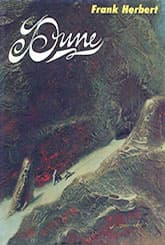Dune
CRITIQUE | THE TEXT | AT THE MOVIES
 First edition
First editionAlso called
Dune Chronicles, Book 1
First publication
1965, United States
Literature form
Novel
Genres
Science fiction, fantasy
Writing language
English
Author's country
United States
Length
Approx. 188,000 words
Notable lines
In the week before their departure to Arrakis, when all the final scurrying about had reached a nearly unbearable frenzy, an old crone came to visit the mother of the boy, Paul.
— First line
I must not fear. Fear is the mind-killer. Fear is the little-death that brings total obliteration. I will face my fear. I will permit it to pass over me and through me. And when it has gone past I will turn the inner eye to see its path. Where the fear has gone there will be nothing. Only I will remain.
"You've heard of animals chewing off a leg to escape a trap? There's an animal kind of trick. A human would remain in the trap, endure the pain, feigning death that he might kill the trapper and remove a threat to his kind."
Once men turned their thinking over to machines in the hope that this would set them free. But that only permitted other men with machines to enslave them.
"She said the mystery of life isn't a problem to solve, but a reality to experience. So I quoted the First Law of Mentat at her: 'A process cannot be understood by stopping it. Understanding must move with the flow of the process, must join it and flow with it."
What was it St. Augustine said? she asked herself. "The mind commands the body and it obeys. The mind orders itself and meets resistance."
"If wishes were fishes, we'd all cast nets."
"Science is made up of so many things that appear obvious after they are explained."
Then, as his planet killed him, it occurred to Kynes that his father and all the other scientists were wrong, that the most persistent principles of the universe were accident and error.
"One of the most terrible moments in a boy’s life," Paul said, "is when he discovers his father and mother are human beings who share a love that he can never quite taste. It’s a loss, an awakening to the fact that the world is there and here and we are in it alone. The moment carries its own truth; you can’t evade it."
"Think on it, Chani: the princess will have the name, yet she'll live as less than a concubine—never to know a moment of tenderness from the man to whom she's bound. While we, Chani, we who carry the name of concubine—history will call us wives."
— Last lines
CRITIQUE | THE TEXT | AT THE MOVIES

